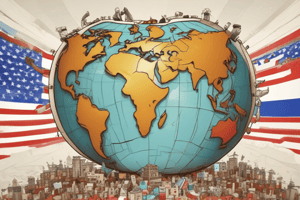Podcast
Questions and Answers
What do mixed methods in political science primarily aim to achieve?
What do mixed methods in political science primarily aim to achieve?
- To simplify political phenomena into basic descriptions.
- To focus exclusively on quantitative data for accuracy.
- To rely solely on qualitative data for richer insights.
- To combine both qualitative and quantitative approaches. (correct)
Which issue is associated with the increasing interconnectedness of economies and cultures?
Which issue is associated with the increasing interconnectedness of economies and cultures?
- Populism
- Inequality
- Globalization (correct)
- Political instability
What is a defining characteristic of political polarization?
What is a defining characteristic of political polarization?
- Unifying political movements that embrace common beliefs.
- Deep division and mistrust among different groups. (correct)
- Increased trust among different societal groups.
- Decreasing political violence and stability.
Which type of political system is characterized by rule without restrictions on power?
Which type of political system is characterized by rule without restrictions on power?
Which phenomenon is often a consequence of a growing gap between the rich and the poor?
Which phenomenon is often a consequence of a growing gap between the rich and the poor?
What does American Politics primarily examine?
What does American Politics primarily examine?
Which of the following best defines legitimacy in political science?
Which of the following best defines legitimacy in political science?
What is a core focus area of International Relations?
What is a core focus area of International Relations?
Which of the following describes political culture?
Which of the following describes political culture?
In political science, what are formal models used for?
In political science, what are formal models used for?
Which type of power involves the ability to influence others against their will?
Which type of power involves the ability to influence others against their will?
What is the main focus of Comparative Politics?
What is the main focus of Comparative Politics?
What does Political Theory primarily explore?
What does Political Theory primarily explore?
Flashcards
Mixed Methods in Political Science
Mixed Methods in Political Science
The combination of qualitative and quantitative research methods to examine political issues more thoroughly.
Globalization
Globalization
The growing interconnectedness of national economies, cultures, and political systems due to increased trade, communication, and travel.
Political Instability
Political Instability
The increase in political violence, terrorism, and civil conflicts worldwide, creating instability and uncertainty.
Inequality
Inequality
Signup and view all the flashcards
Democracy
Democracy
Signup and view all the flashcards
Power
Power
Signup and view all the flashcards
Authority
Authority
Signup and view all the flashcards
Legitimacy
Legitimacy
Signup and view all the flashcards
Institutions
Institutions
Signup and view all the flashcards
Ideology
Ideology
Signup and view all the flashcards
Political Culture
Political Culture
Signup and view all the flashcards
Qualitative methods
Qualitative methods
Signup and view all the flashcards
Study Notes
Branches of Political Science
- Political science is the study of power, its acquisition, use, and consequences.
- Core subfields include American Politics, Comparative Politics, International Relations, and Political Theory.
- American Politics examines the US government, political behavior, and policy processes.
- Comparative Politics compares governments and political systems across countries, identifying similarities and differences.
- International Relations studies interactions between states, international organizations, and non-state actors.
- Political Theory explores fundamental questions about justice, rights, democracy, and citizenship.
Key Concepts in Political Science
- Power: The ability to influence others' behavior, even against their will. Different types of power include coercive, persuasive, and symbolic.
- Authority: The legitimate right to exercise power. Authority is often tied to established institutions and rules.
- Legitimacy: The acceptance of a government or regime's right to rule by the people it governs. Legitimacy influences a government's effectiveness.
- Democracy: A form of government where citizens choose their leaders and participate in decision-making. Different models exist, from direct to representative democracy.
- Institutions: Formal and informal rules shaping political behavior. Examples include constitutions, political parties, and legislatures.
- Ideology: A set of beliefs and values influencing individuals' political perspectives. Examples include liberalism, conservatism, socialism, and fascism.
- Political Culture: Shared beliefs, attitudes, and values shaping political behavior within a society.
Methods of Political Science Research
- Qualitative methods: Focus on in-depth case studies, interviews, and historical analysis. These methods provide rich insights, but may not be generalizable.
- Quantitative methods: Employ statistical analysis and surveys to measure political behavior and outcomes. These methods provide broad patterns but may lack qualitative depth.
- Formal modeling: Uses mathematical and logical tools to explore political processes and predict outcomes. Formal models often assume ideal conditions, potentially differing from reality.
- Mixed methods: Combine qualitative and quantitative approaches for a more comprehensive understanding of political phenomena.
Key Issues in Contemporary Political Science
- Globalization: Increasing interconnectedness of economies, cultures, and political systems.
- Political instability: Rise of political violence, terrorism, and civil conflicts.
- Inequality: Growing gap between rich and poor, potentially leading to social unrest and political polarization.
- Climate change: Impact of environmental issues on political stability and international relations.
- Populism: Rise of political movements appealing to the common people, often opposing traditional institutions.
- Political polarization: Increasing division between social groups, marked by deep differences and mistrust.
Political Systems
- Different political systems exist, including:
- Democracies: Representative or direct.
- Authoritarian systems: Dictatorships, totalitarian regimes.
- Monarchies: Constitutional or absolute.
- Mixed systems and hybrid models.
- Analysis often considers institutions, political culture, and economic factors.
Studying That Suits You
Use AI to generate personalized quizzes and flashcards to suit your learning preferences.




